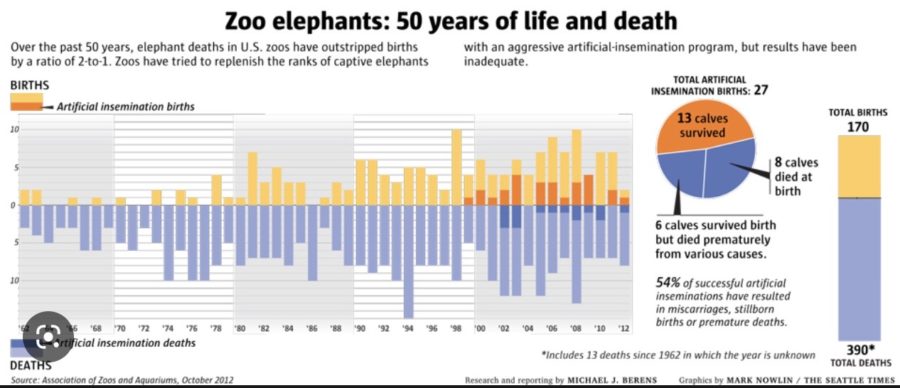Why Zoos Should be Illegal
The capturing and encaging of elephants has increased the death rate significantly.
March 27, 2023
Zoos have been a popular form of entertainment and education for people for centuries. However, there are growing concerns about the ethical implications of keeping animals in captivity for human amusement. While zoos are often praised for their conservation efforts and educational opportunities, there are many reasons why they are actually harmful to the animals they claim to protect.
Firstly, zoos cause immense psychological distress to the animals. Animals are social creatures who would normally live in large groups in their natural habitats. This especially applies to herd animals such as zebras, buffalo, and wildebeest. Captivity keeps these animals isolated and gives them no room to breathe. This leads to mental health problems like extreme boredom and depression. According to National Geographic, Zoochosis, a neurological disorder, affects nearly 80 percent of zoo animals. This statistic alone is why people should rethink the purpose of zoos. Zoochosis causes animals to display abnormal, self-destructive behaviors such as self-harm, tongue biting, over-grooming and self-mutilation, and head bobbing.
Animals also suffer from physical health problems due to their confinement, such as obesity, foot and joint problems, and dental issues. Taking animals out of their natural habitat disrupts the natural order. This prevents things that are naturally supposed to happen for animals in the wild, such as getting enough exercise and eating the right food to keep their teeth clean. Furthermore, animals in zoos are usually forced to adopt new diets and live in environments they are not suited for. This only ever leads to nutritional deficiencies and stress.
Zoos claim that they are essential for conservation efforts but that’s been proven time and time again to be largely untrue. Many zoos capture animals that are not endangered or threatened in the wild, purely for entertainment purposes. This only further contributes to the extinction crisis because removing animals from their natural habitat destroys nature’s natural balance.
“Although some zoos do participate in rehabilitation programs, the success rate of these programs is extremely low.” shares Avani Catana (10).
Though one can argue that zoos may provide some educational value, they are simply not capable enough to take care of animals enough to keep them safe and happy. They choose to be ignorant about the harm they are causing and don’t get nearly enough effort into thinking of an alternative solution. Kids shouldn’t associate wild animals with cages and being captive. They should learn about how animals operate in the wild where they’re allowed to be free. Once zoos prove that they’re able to house wild animals and make sure that they’re just as healthy behind a cage as they are in the wild, is when zoos will become acceptable. But, that isn’t the case, which is why people should learn to leave nature in nature and understand that disrupting an animal’s way of life is, to be frank, cruel. People should take the time to research and rethink our relationship with zoos, and higher-ups should find enough decency to at least reconsider the purpose of a zoo and what message it sends.





































